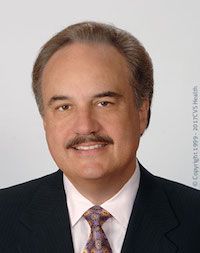Article
CVS Eyes Localized Health Care With $69 Billion Aetna Purchase
Author(s):
CVS Health currently operates about 9,700 retail locations, 1,100-plus walk-in medical clinics, and has almost 90 million plan members.

Larry J. Merlo, CEO, President, CVS Health
Pharmacy company CVS Health has announced intentions to acquire health and dental care company Aetna in a $69 billion deal that indicates changes in national health care costs, and settings of care.
In a joint press release announcing the purchase — which includes a supplemental $8 billion for the assumption of Aetna’s debt — CVS Health president and chief executive officer Larry J. Merlo said the 2 companies will combine to “remake the consumer health care experience.”
“With the analytics of Aetna and CVS Health's human touch, we will create a health care platform built around individuals,” Merlo said in the Sunday press release.
CVS Health currently operates about 9,700 retail locations, 1,100-plus walk-in medical clinics, and has almost 90 million plan members, according to the company.
At the time of its purchase, Aetna served about 44.6 million people with health insurance products and services. It is the third largest health insurer in the US, with coverage options including medical, pharmacy, dental, behavioral health, life, disability plans, Medicaid services, and worker’s compensation services.
Mark T. Bertolini, Aetna chairman and chief executive officer, likened the partnership and its impeding services to empowering consumers.
“Together with CVS Health, we will better understand our members' health goals, guide them through the health care system and help them achieve their best health,” Bertolini said.
With the partnership, CVS intends to implement new locations in its pharmacies dedicated to new health services, as well a “community-based health hub dedicated to connecting the pathways needed to improve health and answering patients' questions.”
The combined companies also expressed hope to address chronic disease treatment with physician intervention through telehealth services, as well as follow-up counseling to improve patient adherence to prescribed treatment.
“These types of interventions are things that the traditional health care system could be doing, but the traditional health care system lacks the key elements of convenience and coordination that help to engage consumers in their health,” Merlo said.
The news comes less than a week following CVS Health’s announcement that their pharmacy benefits manager (PBM) will begin providing real-time medication cost insights through Surescripts.
The healthcare information network will give patients a stronger perspective on alternative or more cost-considerate treatment options at the time of their prescription or visit to a CVS pharmacy.
It will also provide them the ability to consider whether a prescription should be filled or not, in response to research that patients have an inadequate amount of available information on the drugs available to them under their health care plans.
Costs of about $300 billion is caused annually by treatment non-adherence in US health care.
Christian Ruff, MD, MPH, of the TIMI study group and the Cardiovascular Division at Brigham and Women's Hosptial told MD Magazine that being able to tailor medicines for patients will benefit physicians in improving treatment adherence.
"Frequently, we prescribe medications only to find out from the patient that the copay was too expensive or that the drug was not approved unless we filled out a prior authorization,” Ruff said. “Many times the patient will just not pick up the mediation and not tell us and we find out at their next visit months later. Now the health care provider will get real-time information about cost and need for prior authorization.”
Zachary Bloomgarden, MD, MACE, clinical professor of medicine at the Icahn School of Medicine at Mount Sinai, countered that the insight will only be beneficial conditional to the treatments it recommends.
“The differences in outcomes should be part of the picture presented to the patient, and if it is not then it is unlikely that these presentations of "alternatives" will result in improvement in health outcomes,” Bloomgarden told MD Magazine.
At the time of the announced real-time healthcare information implementation, CVS Health released a US-based study on its website that indicated patients are not satisfied with current health care systems.
The study — a survey of 2,201 adults conducted by Morning Consult for the company in October — found that 73% of surveyed adults believe the health care system is in need of reform, with another 65% stating its current costs are too expensive.
There was also a dichotomy in perspective between insured and uninsured people surveyed. About 83% of insured participants were either somewhat or very satisfied with their coverage. But nearly half of uninsured participants stated they have not sought any forms of common treatment over the span of the past year.
Merlo said on Monday that the combined companies will be able improve plans for Medicare and Medicaid patients, noting that the “real opportunity is in government business.”
At the time of 2015 reports from the US Census Bureau, more than 118 million US residents had a form of government-based health insurance.
Merlo likened the new entity to creating a “new front door to health care in America.”
“We know we can make health care more affordable and less expensive,” Merlo said.
Related Coverage
CVS Health to Provide Real-Time Prescription Information


